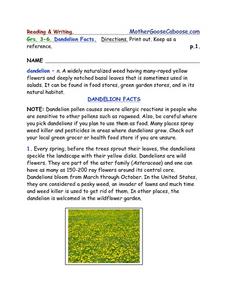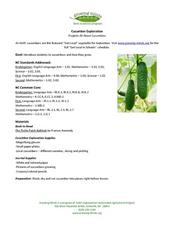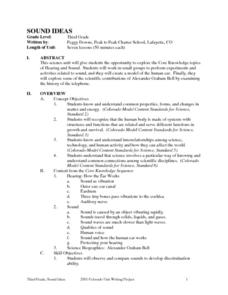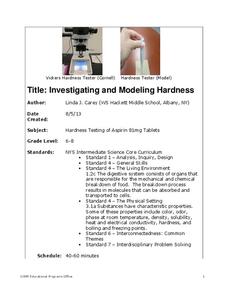Curated OER
Tomato Exploration
Create tomatoes in 15-20 minutes using this fun and interactive lesson plan! Learners listen to a book about tomatoes (recommendations listed), and focus on the vocabulary word tomato. They count the syllables and practice the plural....
Growing Minds
Growing Minds: Cabbage Exploration
It's all about cabbage in this scientific observation resource! After reading a related story, learners explore three varieties of cabbage. They observe the leaves using a leaf diagram, predicting what the middle might look like. They...
Institute of Electrical and Electronics Engineers
Chair Lift Challenge
During the Winter Olympics, this would be an engaging task to include in your STEM lesson. Design teams plan, construct, and test a miniature ski lift that can carry a pingpong ball up and down a rope line without falling out. With this...
University of California
You Are What You Eat: Testing for Organic Compounds in Foods
We have all heard that we are what you eat, but what are we eating? An informative lesson opens with a discussion of the foods pupils have recently eaten. Then, young scientists perform four experiments on seven different foods to...
Discovery Education
Future Fleet
Turn your pupils into engineers who are able to use scientific principals to design a ship. This long-term project expects pupils to understand concepts of density, buoyancy, displacement, and metacenter, and apply them to constructing a...
Santillana USA
Celebra Kwanzaa
¡Celebramos Kwanzaa! Celebrate Kwanzaa through the fictional story Celebra Kwanzaa con Botitas y sus gatitos to delightfully explain the seven principles of Kwanzaa. Dual language learners participate in reading and vocabulary activities...
Henry Ford Museum
Sustainability: Environmental Management and Responsible Manufacturing
When you think about environmental sustainability, the Ford Motor Company probably isn't the first company to come to mind. A four-lesson unit introduces learners to the idea of sustainability and environmental stewardship. It describes...
Howard Hughes Medical Institute
What van Leeuwenhoek Saw
When van Leeuwenhoek saw cells and single-celled organisms for the first time, he knew these small things were a big deal! Share his discoveries with young learners through a narrated video, model-building activity, and scale study....
Curated OER
Aging of Trees
Students examine tree rings to determine its age. In this tree ring lesson, students examine core tree samples, identify the tree rings, and then determine its age. Students complete a worksheet, deciding which of the two core sample is...
Curated OER
Farm Products Help Me Grow
Students view a display of empty food containers (or illustrations). They select a food and decide as a class if it has an animal or plant origin. Students view a display of common farm animals that are commonly eaten (cow, pig, chicken,...
Curated OER
Ecosystem Damage from Household Cleaners
Third graders assess the damage done to various ecosystems by cleaning products and discover how scientists test water quality. Using stream water and common household cleaning agents, they work in groups to test for pH levels. Once...
Curated OER
Project Geode
Pupils predict the appearance of a geode's internal structure based on its mass and density. They form a hypothesis based on the data they collect. They also identify common minerals found in Illinois.
Curated OER
Quiz: Weather Phenomena #1
In this science worksheet, 3rd graders focus on the weather. Students respond to ten multiple choice questions about various aspects pertaining to our weather.
Curated OER
Our Treasured Trees
Young scholars discuss natural resources and renewable resources with trees being considered renewable resources which need special attention. In this Earth science lesson, students write a list of reasons for why it would be good to...
Curated OER
Dandelion Facts- Reading and Writing Worksheet Packet
In this set of worksheets about dandelions, students read the definition and 10 pages of facts about the common weed. They look at pictures that are related to the facts.
Curated OER
Biology Career Exploration
Students select a biology-related career for research. They use school and community resources to gather information for this career. Students complete a college application. They share their findings with classmates.
Curated OER
Digital Story with Math Vocab Words
Create digital stories with your class, in order to help further understand math vocabulary. You can modify this activity idea to any vocabulary lesson, whether it be for math, science, or language arts!
Growing Minds
Growing Minds: Cucumber Exploration
After reading a picture book about planting and harvesting cucumbers, learners get a chance to examine some cucumbers of their own. First, they see photographs of a cucumber on a vine, and learn that it is part of the gourd family. They...
Prestwick House
Rhetorical Devices in Political Speeches
Have you ever watched a political speech and felt your heart beat a little faster, and your opinion either solidify or begin to slightly change? Rhetorical devices can be a strong tool in an effective and powerful speech. A short lesson...
Curated OER
Sound Ideas
Complete a unit of lessons on hearing and sound. Learners conduct sound experiments, research the history of the telephone and scientific contributions of Alexander Graham Bell, and create a model of the human ear.
Cornell University
Investigating and Modeling Hardness
Model hardness testing with a self-designed hardness test. Young scholars rate the hardness of different types of aspirin using the Vicker's Hardness scale. They then relate hardness to the solubility of each aspirin tablet.
Serendip
How Do Biological Organisms Use Energy?
When an organism eats, how does food become energy? Young biologists follow glucose through the process of cellular respiration to the creation of ADP using a discussion-based activity. The resource also highlights conservation of mass...
Curated OER
For the Birds
Second graders observe, identify, and document birds sighted at the library feeder station. They observe and document birds in order to begin their birder's life list. They apply scientific concepts and principles by using library...
Curated OER
The Five Classes of Vertebrates
What a terrific lesson! Learners discuss the animal kingdom, and classify them as vertebrates and invertebrates. They also identify them as fish, amphibians, reptiles, birds, and mammals. There is even a taxonomic breakdown of popular...

























